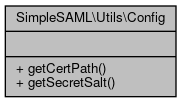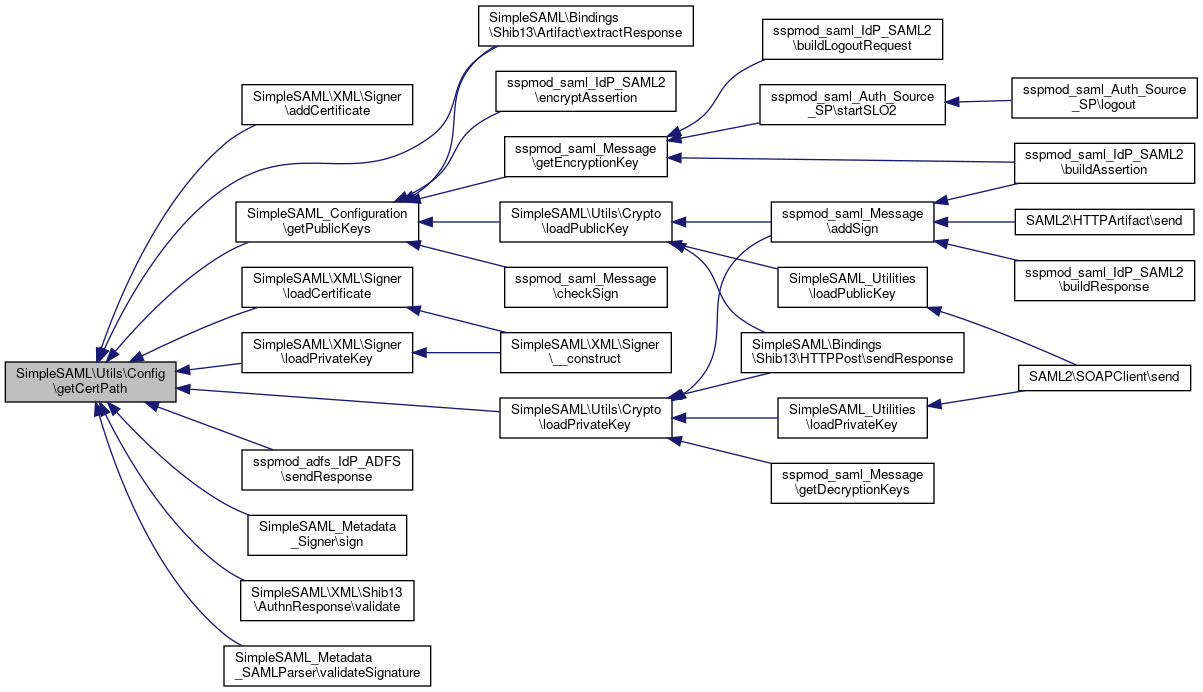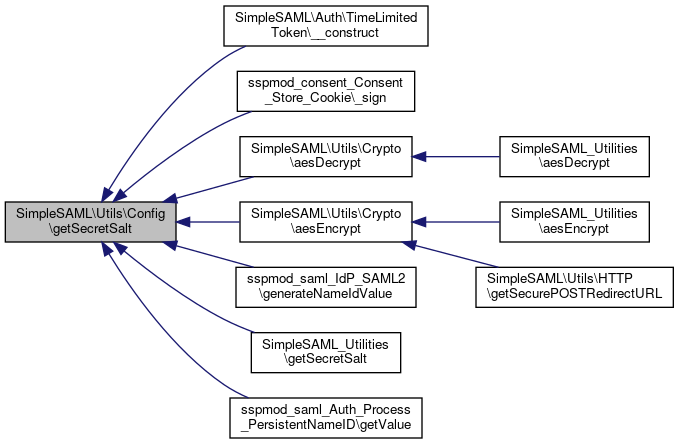 Collaboration diagram for SimpleSAML\Utils\Config:
Collaboration diagram for SimpleSAML\Utils\Config:Static Public Member Functions | |
| static | getCertPath ($path) |
| Resolves a path that may be relative to the cert-directory. More... | |
| static | getSecretSalt () |
| Retrieve the secret salt. More... | |
Detailed Description
Definition at line 9 of file Config.php.
Member Function Documentation
◆ getCertPath()
|
static |
Resolves a path that may be relative to the cert-directory.
- Parameters
-
string $path The (possibly relative) path to the file.
- Returns
- string The file path.
- Exceptions
-
InvalidArgumentException If $path is not a string.
Definition at line 22 of file Config.php.
References $base, $globalConfig, $path, SimpleSAML_Configuration\getInstance(), and SimpleSAML\Utils\System\resolvePath().
Referenced by SimpleSAML\XML\Signer\addCertificate(), SimpleSAML_Configuration\getPublicKeys(), SimpleSAML\XML\Signer\loadCertificate(), SimpleSAML\XML\Signer\loadPrivateKey(), SimpleSAML\Utils\Crypto\loadPrivateKey(), sspmod_adfs_IdP_ADFS\sendResponse(), SimpleSAML_Metadata_Signer\sign(), SimpleSAML\XML\Shib13\AuthnResponse\validate(), and SimpleSAML_Metadata_SAMLParser\validateSignature().
 Here is the call graph for this function:
Here is the call graph for this function: Here is the caller graph for this function:
Here is the caller graph for this function:◆ getSecretSalt()
|
static |
Retrieve the secret salt.
This function retrieves the value which is configured as the secret salt. It will check that the value exists and is set to a non-default value. If it isn't, an exception will be thrown.
The secret salt can be used as a component in hash functions, to make it difficult to test all possible values in order to retrieve the original value. It can also be used as a simple method for signing data, by hashing the data together with the salt.
- Returns
- string The secret salt.
- Exceptions
-
InvalidArgumentException If the secret salt hasn't been configured.
Definition at line 49 of file Config.php.
References SimpleSAML_Configuration\getInstance().
Referenced by SimpleSAML\Auth\TimeLimitedToken\__construct(), sspmod_consent_Consent_Store_Cookie\_sign(), SimpleSAML\Utils\Crypto\aesDecrypt(), SimpleSAML\Utils\Crypto\aesEncrypt(), sspmod_saml_IdP_SAML2\generateNameIdValue(), SimpleSAML_Utilities\getSecretSalt(), and sspmod_saml_Auth_Process_PersistentNameID\getValue().
 Here is the call graph for this function:
Here is the call graph for this function: Here is the caller graph for this function:
Here is the caller graph for this function:The documentation for this class was generated from the following file:
- libs/composer/vendor/simplesamlphp/simplesamlphp/lib/SimpleSAML/Utils/Config.php





